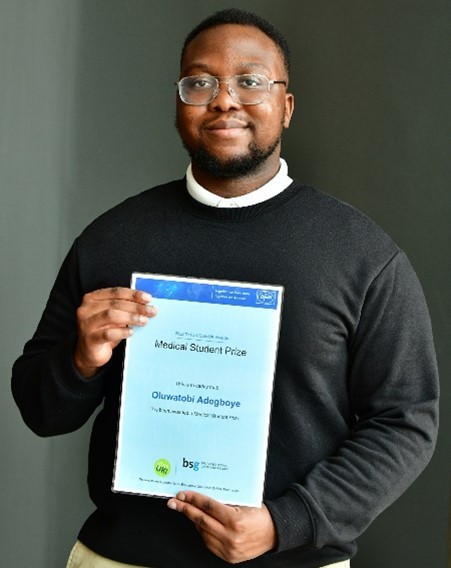University of Ұ������ medical student wins prestigious UK national award
A medical student at the University of Ұ������ has gained a top prize in the prestigious 2022 Dr Falk-Pharma/Guts UK Charity national awards. Mr Oluwatobi Adegboye won the Medical Student Prize for his research project, which investigated the links between circadium systems and advanced liver fibrosis.
The project, entitled ‘Does Disruption of the Circadian Clock System Advance Liver Fibrosis was carried out at the at the School of Biological Sciences at the University of Ұ������ whilst intercalating for his BSc in Anatomical Sciences.
Mr Adegboye was presented with his award and £1,500 prize at the annual meeting of the British Gastroenterology Society (BSG) on Tuesday June 21st. The ceremony took place during a special dinner at the Raddison Blu Hotel in Birmingham, with the awards presented by the Chair of the BSG and attended by other illustrious names in gastroenterology medicine along with the CEO of Guts UK.
The Dr Falk Pharma/Guts UK Awards are dedicated to encouraging research and promoting patient care in the field of gastroenterology and hepatology. Since 2007 they have rewarded over 120 dedicated young health care professionals, including medical students, junior doctors, nurses and dietitians.
Mr Adegboye explains, ‘I have developed a keen interest in liver disease because it affects so many people across so many aetiologies. Further, liver disease is going to be one of the major health challenges of the future. Organ fibrosis occurs across all liver disease and so if we can find a method of treating fibrosis it would be of enormous benefit.
I am so pleased to have been awarded this prize. Itis a reward for all the hard work that has gone into this project, not just for me but for all the team. I am really interested in pursuing a career in clinical research and this is a very competitive are of medicine so this award will be really useful for my CV and to open some doors as I build my career
This project aims to investigate whether the Circadian Clock System (CCS) contributes to the advancement of progressive fibrosis in the liver. If our hypothesis is correct, it would suggest that CCS disruption advances liver fibrosis - a condition which is associated with most of the morbidity and mortality related to CLD. This may pave the way for the development of therapies to target the liver’s circadian rhythms may be a way to halt or reduce fibrotic progress.’
‘I am so pleased to have been awarded this prize. Itis a reward for all the hard work that has gone into this project, not just for me but for all the team. I am really interested in pursuing a career in clinical research and this is a very competitive are of medicine so this award will be really useful for my CV and to open some doors as I build my career.’
Mr Adegboye’s Project Supervisor Professor Karen Piper Hanley comments : ‘Oluwatobi has been a great student to have in the lab. His enthusiasm has been fantastic, and our collective lab have been delighted with both his intellectual and technical in-put into the project. His contributions will most certainly be recognised as we look to publish these findings.’
